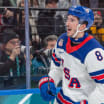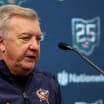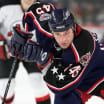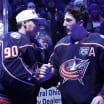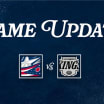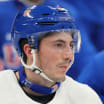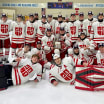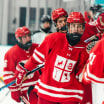Even the best ideas don't always stand the test of time.
Maybe that's a testament, then, to what a great idea the Blue Jackets Foundation's Hats for Heroes program has been.
At the organization's inception, founder John H. McConnell had a vision of a franchise that would not only thrill central Ohio on the ice but one that would be a force for good off of it.
Hats for Heroes program has stood the test of time
Fundraising, relationships are hallmarks of pediatric cancer-focused program from CBJ Foundation
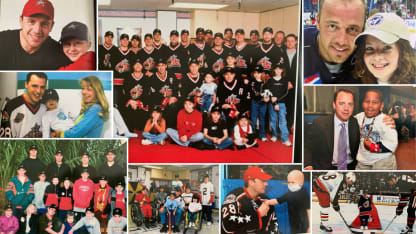
By
Jeff Svoboda
BlueJackets.com
Consistently throughout those 20 years, the Blue Jackets organization has focused on making a difference when it comes to those suffering from pediatric cancer. No program has meant more to that quest than Hats for Heroes.This platform alone has raised more than $3 million for pediatric cancer research and to support patients and their families.
It was started by Tyler Wright and Wendy Bradshaw. In 2000, the original Blue Jackets forward and the first Executive Director of the CBJ Foundation put their heads together and came up with an idea to raise money and recognize the youngsters fighting so valiantly here in central Ohio.
20 Years of NCH & CBJ Foundation
How big of a winning formula has it proved to be? The program continues to this day as one of the hallmarks of the CBJ Foundation's efforts to support the community.
"When your career is done and you look back at kind of what you accomplished, I'm pretty proud of my career as a hockey player, but more importantly I am more proud of the work that we have done off the ice, with the Hats for Heroes program front and center for me," Wright said. "I think that's one of the proudest moments when I look back at my career."
"When you look back, it's more than a game, and I was able to use that platform that I was on at that time. It's continuing to go, so I'm extremely proud of it and I'm extremely proud of the people that I had around me that helped us."
This year's limited-release hats are now available as part of Hockey Fights Cancer month, featuring a new design in recognition of the team's 20th season. Hats will remain for sale while supplies last, and fans can go to
www.CBJAUCTION.givesmart.com
to buy theirs.
From the first time those hats went on sale in the team's inaugural season, they've been a perfect way to recognize the battles local pediatric cancer patients were facing. Sales of the hats, many autographed by CBJ players, have been able to raise money for the foundation's efforts, while the hats delivered to kids in the hospital serve as a sign that the Blue Jackets' thoughts are never far away.
The heroes, meanwhile, are those kids fighting a battle that no one that age should ever have to face. Each year, the Blue Jackets designate a handful of youngsters facing cancer as the organization's cancer heroes, visiting them in the hospital, joining for in activities with the kids and hosting them at an annual game, though the COVID-19 pandemic is limiting in-person activities this year.
"We knew we were going to focus on pediatric cancer, but how were we going to do that in a way that was unique to Columbus?" Bradshaw remembered of the early days of Hats for Heroes. "We wanted to raise awareness but we also wanted to raise critical funding, so we started thinking it through from a couple of different perspectives. The hats served a purpose; we knew if we had a hat we could sell, it would raise funds, but we could also use that hat as a gift to the kids that we were visiting with the players in the hospital.
"So the hat became sort of the core, and then the name derived from the true definition of hero, and hero just being someone that you just admire for their courage. The kids and the families that we met, I could go on forever, but the hero word is so appropriate here based on the kids that we met that were literally battling every day."
Bradshaw said that the initiative was embraced by all Jackets players, including such fan favorites as Jared Boll and Jody Shelley, but the enterprise wouldn't have taken off were it not for Wright, who was with the Blue Jackets for the franchise's first four and a half seasons. He came to Columbus from Pittsburgh, where he was teammates with Tom Barrasso, the Stanley Cup-winning goalie whose daughter Ashley battled neuroblastoma.
Having to watch Barrasso go through the difficult journey of being a parent with a child with cancer, Wright arrived in Columbus looking to give back. With the establishment of the Hats for Heroes program, he jumped in full bore, from giving the effort a face in the community to going above and beyond whenever the heroes were in need, up to and including going to show and tell at school with one.
"Tyler was the face of it and truly was the perfect person," Bradshaw said. "I think what he did was magical in terms of he definitely put in 150 percent of his effort. He would always invite one or two guys to come along, whether it was a hospital visit or a visit to a pumpkin patch. Whatever it was, he would always add a player, which I think was great to show this was something we wanted to build and become the signature focus of the foundation."
Through the years, the stories of many of the heroes remain etched in the fabric of the team. Bradshaw and Wright are still close with many of the families and remember many of the stories from the early days, from Brandon Alt, who was on the original poster made to publicize Hats for Heroes and passed away of leukemia in 2001 at the age of 4; to Jesse Crow, who beat kidney cancer and now works as a cancer researcher at Nationwide Children's Research Institute; to Delaney Diggs, who passed away in 2011 at age 15 of Ewing Sarcoma and helped inspire Crow to get into medicine; to Chase Meacham, who in 2007 spoke in Washington DC to a bipartisan group of congressional leaders to introduce the Conquer Childhood Cancer Act.
"There are a lot of great stories, but a lot of sad stories and a lot of tears shed along the way where we didn't win every fight," Wright said. "To this day, I still keep in touch with people and families from kids that have grown up and starting to make their way into early adulthood, and it makes you feel a little bit older but it puts a smile on your face, too. At the same time, you remember the ones that you've lost along the way and you have some contact with some family members, moms and dads and siblings.
"It's not always great stories, but they are all human life stories. This stuff really happens, and it's unfortunate, but I think as a professional hockey player, when an organization can do their part to ease somebody's mind at the time or put a smile on their face, it's well worth it."
That it has been, which is why if you come across Wright, who now works as Director of Amateur Scouting for the Edmonton Oilers, you might see a CBJ Hats for Heroes hat on his head to this day.
Considering the work he put in over the years to make the program a success, that should be no surprise.
"I still wear my Hats for Heroes hat," he said. "I'm gonna sign a couple this year, and I said I'll pay for it but I get to keep a hat, too. It's time to update my arsenal as well. It's something that I'm really proud of. It has helped a lot of families go through this. A lot of people have done a lot of great work and I'm pretty proud that it's continuing."





